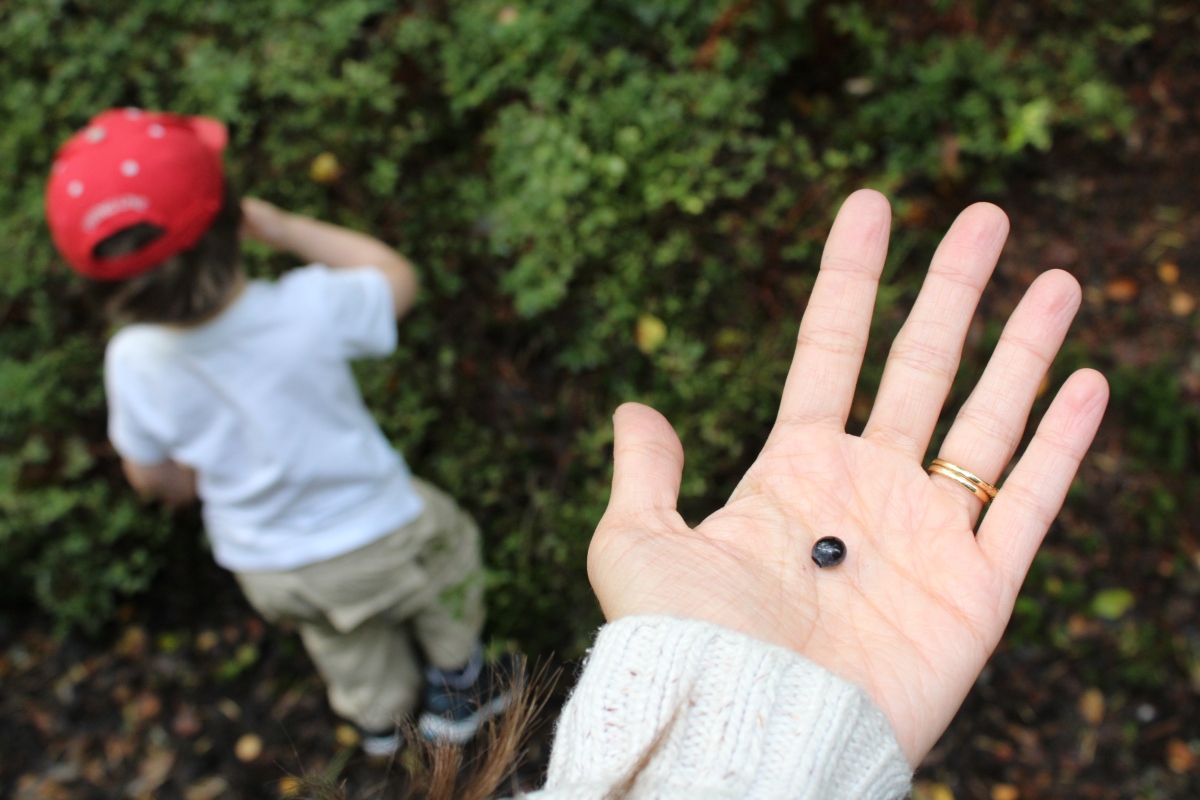In Finland, anyone and everyone has the right to enjoy the countryside, no matter who owns the land, because of the legal concept, ‘everyman’s right’. Anyone may pick and enjoy the numerous varieties of mushrooms and berries that grow there; anyone may walk, ski, cycle, fish, swim and camp in the countryside so long as they respect nature and avoid disturbing the peace.
Whilst visiting schools in Helsinki, I was lucky enough to go mushroom picking in Nuuksio National Park with my lovely teaching colleague and her mushroom-expert husband, but it was her youngest son who showed me the best spots for berry-picking. This contented 3 year old and his 5 year old brother happily meandered through the damp, sunlit woods in their waterproof clothing, chatting, playing and identifying berries that are safe to eat (generously sharing some rather squished ones with me). Their relaxed manner and evident familiarity with the natural environment reminded me of how much time they spend outside each day at their Finnish Kindergarten.
The Finnish history of civil war and economic struggle in the twentieth century combined with their harsh winters has no doubt influenced what appears to be their national affinity with nature and this pervades contemporary life even in the capital. The weather never stops the Finns from jumping in a lake or enjoying their huge forests. And they don’t underestimate nature’s role in raising and shaping their children either.
The Finnish education system values free outdoor play and its influence on child development. Most Finnish kindergarteners and pre-schoolers, who might be as old as six, will spend two or three undirected hours of each school day outside simply playing and socialising. Even at grade school, where students are aged 7-16 years, the curriculum demands that children learn in “authentic environments” which pushes teachers and students beyond the classroom doors.
Many of the Finnish teachers I have met are very conscious of the fact that childhood is a time you can’t have twice so the magic of creative play should be enjoyed for as long as possible. Kindergarten, preschool and grade school teachers alike assert that children must not be rushed into growing up; they should be given time to play and thereby time to develop their social skills, self-awareness and emotional intelligence. Without these key life skills they will struggle to cope with academic aspects of the curriculum later in life. This prioritising of free-play and social time is reflected in the 15-minute breaks students at grade school enjoy every hour and in the reduced hours Finnish students spend in the classroom compared to other nations.
Too often, we read in the press of the lack of time given to play or recess in education systems around the world and its devastating effects on student confidence and self-belief. Despite the research marrying the role of creative play to the evolution of a child’s sense of self-identity, many countries insist on forcing their students behind desks from as young as four years old. Whilst literacy and numeracy skills are unquestionably imperative life-skills, there is little evidence to suggest that studying from such a young age improves student progress in later life.
Surely our curriculums must evolve to reflect the need for children to develop the social skills, creativity and independence to survive in the twenty-first century; we must value the development of the whole-child to ensure that school is a place where students discover their strengths, their interests and emerge confident, self-aware people who have the best chance of finding happiness and success, whatever they may choose to do in the future.


Is the UK too competitive? Do we think too much about what everyone else’s child is doing and question why our children are not the same? Could we start to celebrate indivduality and support our offspring at their own pace of development? It will take a change in attitude it the UK for us to think about things in this way. It is wonderful to hear of a nation where childhood is celebrated and little ones are not hurried into adulthood.
LikeLike
I think your point about pace is pertinent to the way UK education wishes to see a steady rate of linear progress from all their students which is completely unrealistic. More flexible methods of tracking student progress should be devised which acknowledge the huge fluctuations in students’ progress over their time at school. As you say, perhaps competitiveness or over-reliance on comparing students to a national average puts too much pressure on teachers and students to prove they’re making “adequate” progress.
LikeLike
Thanks so much for linking my blogpost about outdoor play in Finnish education! I love your creative projects. Can’t wait to see what you do next!
LikeLike
My two thoughts…
“children learn in “authentic environments” which pushes teachers and students beyond the classroom doors”: perhaps this is why the Nordic nations excel in their support for learners with complex needs (including deafblindness), these students benefit enormously from experiential methods.
So lovely to hear that childhood is nurtured and valued as an unrepeatable, special time.
LikeLike
Yes, the focus on experiential learning is very prevalent here. Many teachers are keen to engage students in the social and emotional aspects of learning as well as the intellectual and academic.
LikeLike